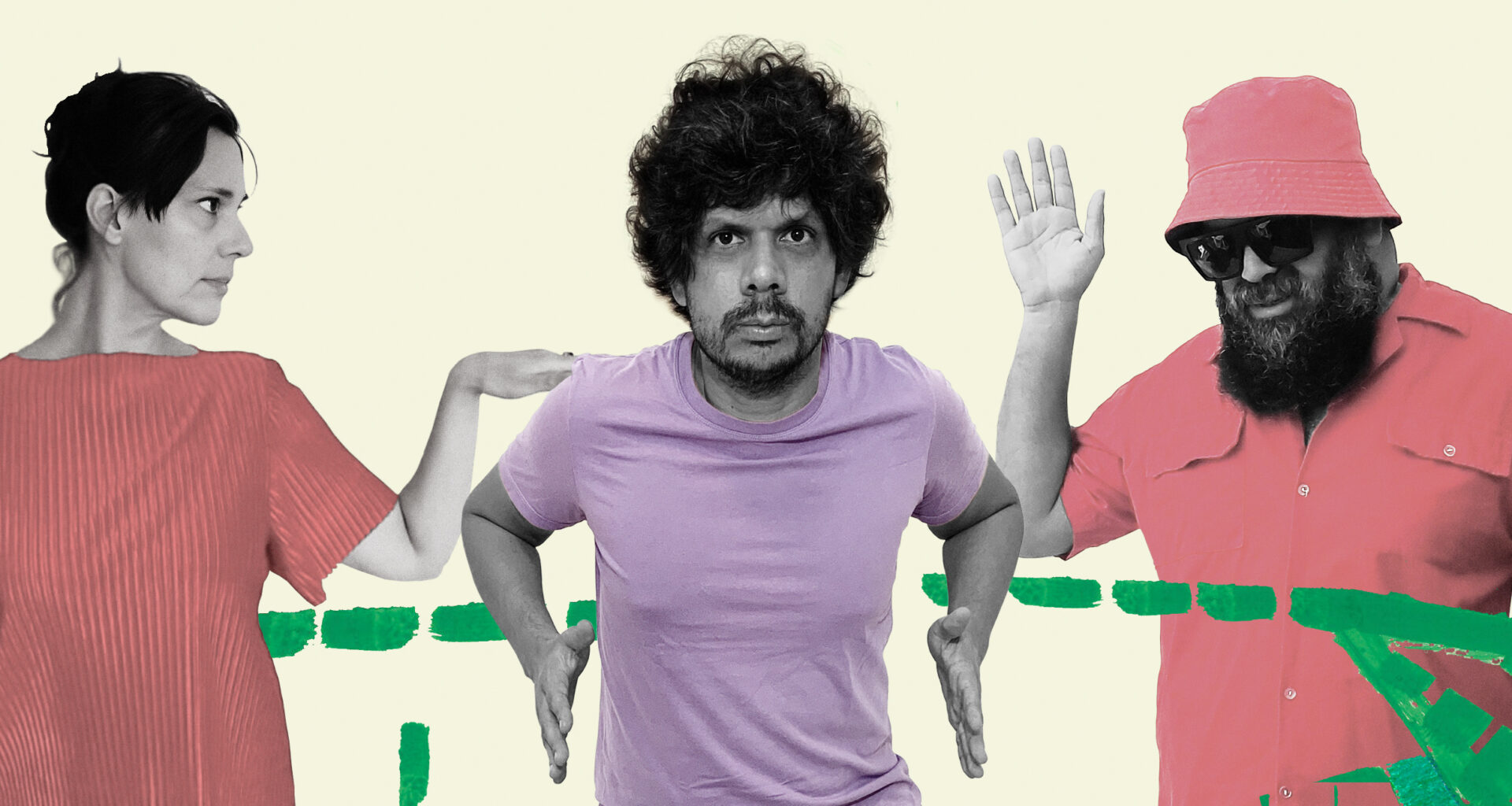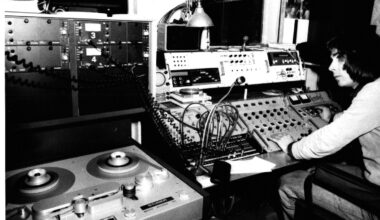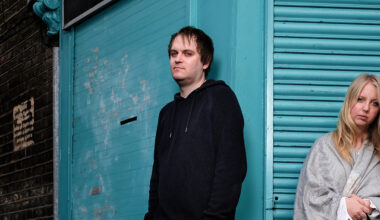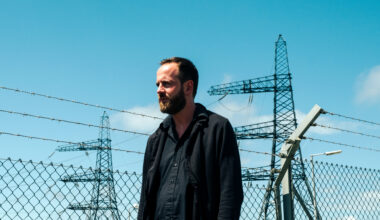As Modern Cosmology, Lætitia Sadier and Brazilian outfit Mombojó make quite the team. Fusing lounge jazz, bossa nova, psych and prog grooves, their debut album is like a lost early Stereolab classic
The constituent members of Modern Cosmology might be 4,660 miles apart as the crow flies, but musically they come from a very similar place. Originally collaborators, billed as Mombojó featuring Lætitia Sadier, they are now a singular collective entity with a miraculous debut album, ‘What Will You Grow Now?’.
“We are huge fans of Lætitia and our first music school was Stereolab,” enthuses Mombojó guitarist Marcelo Machado of himself and his brother Vicente, who plays drums in the band. “We’ve been listening to them since we were 15 years old. When we started to open our minds to electronica and became interested in the dexterity of sound, Stereolab were there.”
French singer Lætitia resides in south London, while the popular indie neo-psychedelic outfit Mombojó, who make up the other five-sixths of Modern Cosmology, are based in Pernambuco in north-east Brazil. All of which begs the question – how did artists who usually function in different hemispheres come together in the first place?
The story began when Marcelo Machado offered to lend Lætitia Sadier an amp when she was touring Brazil in 2010. It came with the condition that he could meet his musical hero, so when that chance came, he took the opportunity to thrust a CD into her hand as they traversed São Paulo in the back of a taxicab.
The disc in question was Mombojó’s second album, ‘Homem-Espuma’ – a delicious riot of sonic colours and fruity beats that certainly has something of Stereolab’s exotica about it. Perhaps they were an inspiration? Or perhaps the influence came across the Pacific from the other direction, given that Tim Gane would cite the space-age pop of Mexican pianist and composer Juan García Esquivel in interviews. And there’s something in Lætitia’s tone that’s reminiscent of the legendary bossa nova singer Astrud Gilberto. Would that be a fair comparison?
“It’s not fair,” deadpans Lætitia, and we all momentarily hold our breath. “It isn’t fair because it’s too huge a compliment!”
We all breathe a collective sigh of relief and laugh.
“I think I sound very French,” she continues. “There’s a sort of timbre in Portuguese voices that is just so inimitable, but I know what you mean.”
Mombojó bass player Missionário “Zé” José, who is also on the line, chips in with a theory.
“Astrud Gilberto and bossa nova as a style were very influenced by the chanson française,” he says.
“Everyone talks about the big jazz singers, but I think it’s that sort of crooning. Lætitia has that quality in her voice. It can be really soft and it’s really beautiful, but there’s an edge to it.”
‘Homem-Espuma’ struck an instant chord with Lætitia. Although the album remained unplayed for two years, when she finally stumbled across it, she contacted the band immediately to register her approval. Yet it seems fortuitous that she found it and played it at all.
“Well, it’s true,” she admits. “I mean, we’re talking a number of years ago, and people tend to give me fewer CDs now than they did then. Usually, I could tell quite quickly if I would enjoy it or not. And when it came to listening to Mombojó, I really got into it and thought I’d get in touch. I wasn’t thinking about doing anything in particular with them – I just felt there was a connection that I found quite vivid. And I acted upon it spontaneously.”
Lætitia is a willing collaborator whose name pops up on works as disparate as those of Common and Aksak Maboul. I allude to the dazzling duet ‘Je Ne Vois Que Vous’, which she recorded with Belgian chanteur Benjamin Schoos on the small Liège-based label Freaksville in 2012.
“When Benjamin contacted me out of the blue, I thought, ‘This is so cool’. But I didn’t know him – he could have been the worst fascist,” she laughs. “I also instantly connected with Giorgio Tuma from Italy. He sent me a message on Facebook and, serendipitously, the next day Elefant Records sent me a big pack of CDs, including one from him, and it stuck out as a gem.”
Artists hoping to collaborate with Lætitia in the future probably shouldn’t try contacting her this way, however…
“I don’t click all the links on Facebook,” she warns. “My son told me not to click on them because sometimes they’re viruses.”
Stereolab’s underground legend is well known in Europe and the US. Mombojó, on the other hand, are more of an unknown quantity in the UK, though they’re a big deal back home. They’ve played Lollapalooza, collaborated with Manu Chao, supported Patti Smith and in 2006, when ‘Homem-Espuma’ was released, they played ahead of Daft Punk in São Paulo.
“Yeah, we’re big fans of Daft Punk,” says Zé. “Our synth and sampling guy, Chiquinho, especially.”
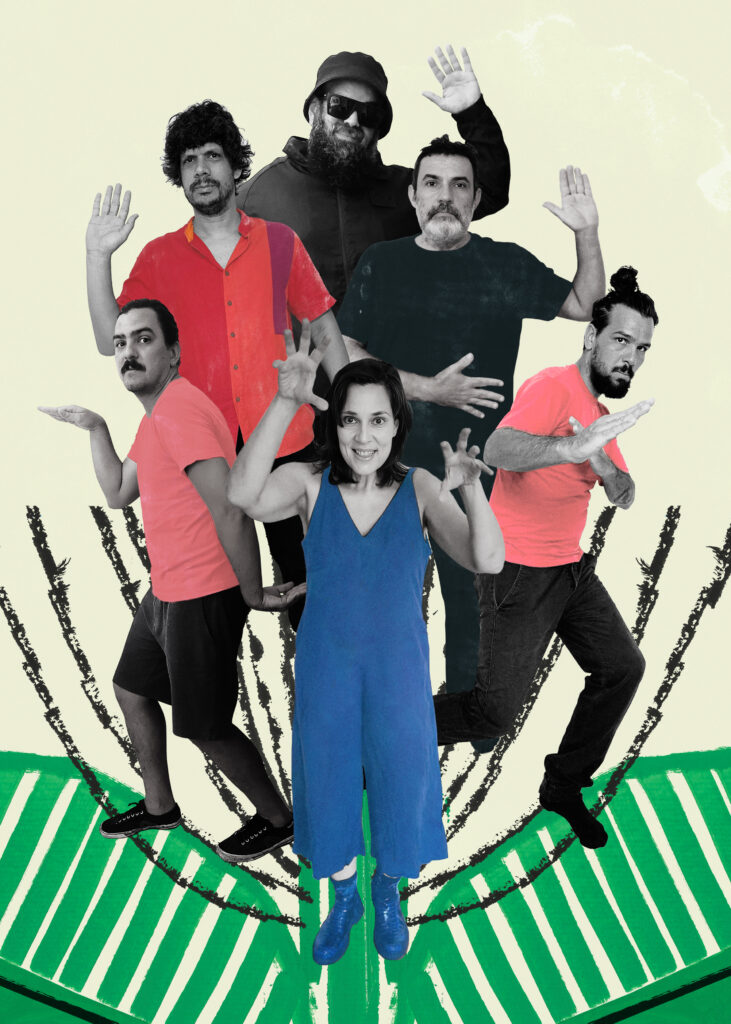
Lætitia has a tenuous link to the French robots herself, via Duophonic, Stereolab’s influential label, which helped start the careers of Thomas Bangalter and Guy-Manuel De Homem-Christo.
“We put out their first songs when they were called Darlin’,” she recalls. “It was a double seven-inch featuring different bands, like Colm and the riot grrrl band Huggy Bear, who were all the rage at the time. And Darlin’ were on there too.”
The singles column in a May 1993 issue of Melody Maker famously referred to Darlin’ as “daft punky trash” – a seminal moment in the duo’s story. Those super-45s are now listed for hundreds of pounds on Discogs.
“If you’re really, really nice to me, then maybe I’ll give you one of them,” jokes Lætitia. “I’ll share my copy with you.”
The history of Modern Cosmology has been more evolutionary than the ineluctable rise of Daft Punk. At first, blown away by Mombojó’s second album, Lætitia offered to do backing vocals should they ever need any. The band spent some time considering her proposal. Three months later, they sent her a track, and it became their first collaboration – 2014’s ‘Summer Long’.
Shortly after, Mombojó’s label Joinha Records secured project funding from the Pernambuco government to bring Lætitia to Brazil so she could work with them. Once scheduling problems were overcome, the musicians decamped to a makeshift studio in the capital, Recife, for a two-week residency, creating what would eventually become 2017’s ‘Summer Long’ EP.
“After it came out, we thought, ‘Well, what do we do next?’,” recalls Lætitia. “And to me, the natural step was to form a band, as opposed to being Mombojó featuring Lætitia Sadier.”
And so we come to ‘What Will You Grow Now?’, the debut album from Modern Cosmology that she describes as being “done at a distance and in spurts”.
The process began innocuously and inadvertently one afternoon in 2018, when the band were attempting to write a soundtrack while sailing down the Capibaribe, the 150-mile river that runs through Pernambuco. The soundtrack was destined for a film being shot by ceramic artist Christina Machado – mother of Marcelo and Vicente – with a giant clay self-effigy floating down the river.
“It’s a film about Christina’s work called ‘Passagem’,” says Zé. “She made a life-size effigy of her torso which she took on a trip down the river with a boat sailing behind, filming everything. It’s video art. And the effigy goes out through the river and into the sea where it’s carried away and sort of melts.”
“Ahhh, I never knew that!” interjects Lætitia excitedly. “That’s such an important part of the story.”
Mombojó took the same boat onto the Capibaribe the following day with their instruments, with the intention of making the soundtrack. When they parked up alongside the river to record, however, they found themselves not far from the bar where they’d performed two shows with Lætitia the last time she’d visited Brazil. Inspiration hit, and they found themselves donning their proverbial Modern Cosmology hats. The soundtrack was quickly forgotten as music suggested itself for their fledgling band.
What makes a song the perfect fit for Mombojó or Modern Cosmology is not clear. It does mean, though, that Mombojó vocalist Felipe S takes more of a back seat to Lætitia and concentrates on his guitar playing – a change of duty he’s happy to perform.
The group duly sent the track off to Lætitia, and when the music came back to them from London, she had written and completed a song now called ‘What Will You Grow Now?’, which would become the album’s title track.
Backing up a little, I’m curious as to whether Christina Machado’s film can be watched anywhere online.
“No, it’s not been released yet,” says Zé. “We have no idea if an actual film will be made of it now, but in the meantime we flipped the idea on its head – we’ll make a video for the track it inspired from the footage available, with the French director and producer Amandine Goisbault, who’s also based in Recife.”
For the last 30 years – or 33 if you count the anarcho-indie band McCarthy that she joined briefly in 1990 – Lætitia has been writing lyrics that challenge the established order, as seen through the prism of someone who’s spent innumerable hours reading works by notable theorists of libertarian Marxism. Her unusual style of songwriting pervades these warm-hued, Latin-infused songs.
“They’re about trust,” she says. “They’re about connection. Emancipation. Freedom. They’re about not hating people, not waging war against people. They’re about taking down the old narratives keeping us down.”
Lætitia might be coming from the left, but she is no polemicist. Her lyrics reflect a nuanced understanding of the world that’s rare in politics and almost unheard of in pop. Take ‘Trauma Release Makes Free’ from the new album.
“It’s a complex topic, this one,” she explains. “But I feel there are certain narratives out there keeping people in their trauma. And it can become a kind of revenge on the ones who brought about that trauma – the patriarchy. This narrative is a bit dangerous, and I feel very strongly that we need harmony between the divine feminine and the divine masculine, the yin and the yang, to go beyond gender.
“My feeling is that people are heavily hypnotised and kept in fear. It’s always the same old story of divide and rule, where you separate women and men, binary and non-binary. The important thing is to bring about harmony and connection between people. The way I view it, we are all one big organism. It’s important we do some deep inner work and heal. When we do that, we’re also healing generations from before – because the trauma gets transmitted. We heal our children and also future generations.”
Of the six tracks on the album, the only one written entirely in French – ‘Le Train Ne Passera Pas’ – is closest to home.
“French is my mother tongue and whenever I get comfortable in one language, I switch to the other to be uncomfortable again. Don’t ask me why.”
As for the song itself, Lætitia says it’s deeply personal.
“It’s a song about my unloving mother. There is a promise that your parents will love you, but they don’t always… or they’re not always able to show their love. So it’s a song about waiting on a platform for a train and being told it will arrive. And then realising, ‘No, this train is not going to arrive now’.”
The one member of the group we haven’t spoken about much yet is Chiquinho, the synth and sample maestro. He isn’t present for our interview as he doesn’t speak English and I don’t speak Portuguese.
“Chiquinho’s involvement with synthesisers is almost haphazard,” says Zé.
“He approaches synths and samplers more like a percussionist,” adds Marcelo. “I’ve played with him in bands since 1999 when we were just kids, and he is a searcher of sounds. He is more worried about the textures and timbre than the technique. He brings something authentic, taking new equipment and always trying to plug in one more cable, one more synthesiser, mixing very old and very new stuff.”
One of the album’s highlights is the hugely funky, Santana-esque ‘Consent For Life’, featuring an extended outro of strange electronic squelches and oscillations. It’s hard to nail down exactly what’s going on, but it’s no less thrilling for it. So how are the track’s unusual sounds generated?
“I recently bought some digital guitars,” says Marcelo. “I use them a lot with Modern Cosmology and they present the opportunity of staying closer to Chiquinho. I now have strings and a whole universe of sounds.”
It transpires that the instrument he’s talking about is a 1980s Casio DG model with weird, flimsy nylon strings. Zé likens it to a SynthAxe, but cheaper.
“In Brazil we have issues regarding the currency conversion rates,” he explains. “It can be very difficult to import electronics – there are even academic works written about this subject.”
As Zé continues, it becomes apparent why Modern Cosmology often sound so otherworldly.
“We experience both sides of the technological divide here. Sometimes we have access to whatever is the latest technology available in sound synthesis, and sometimes we have to do makeshift stuff and come up with our own solutions for technical problems we cannot solve.”
‘What Will You Grow Now?’ is out on Duophonic
